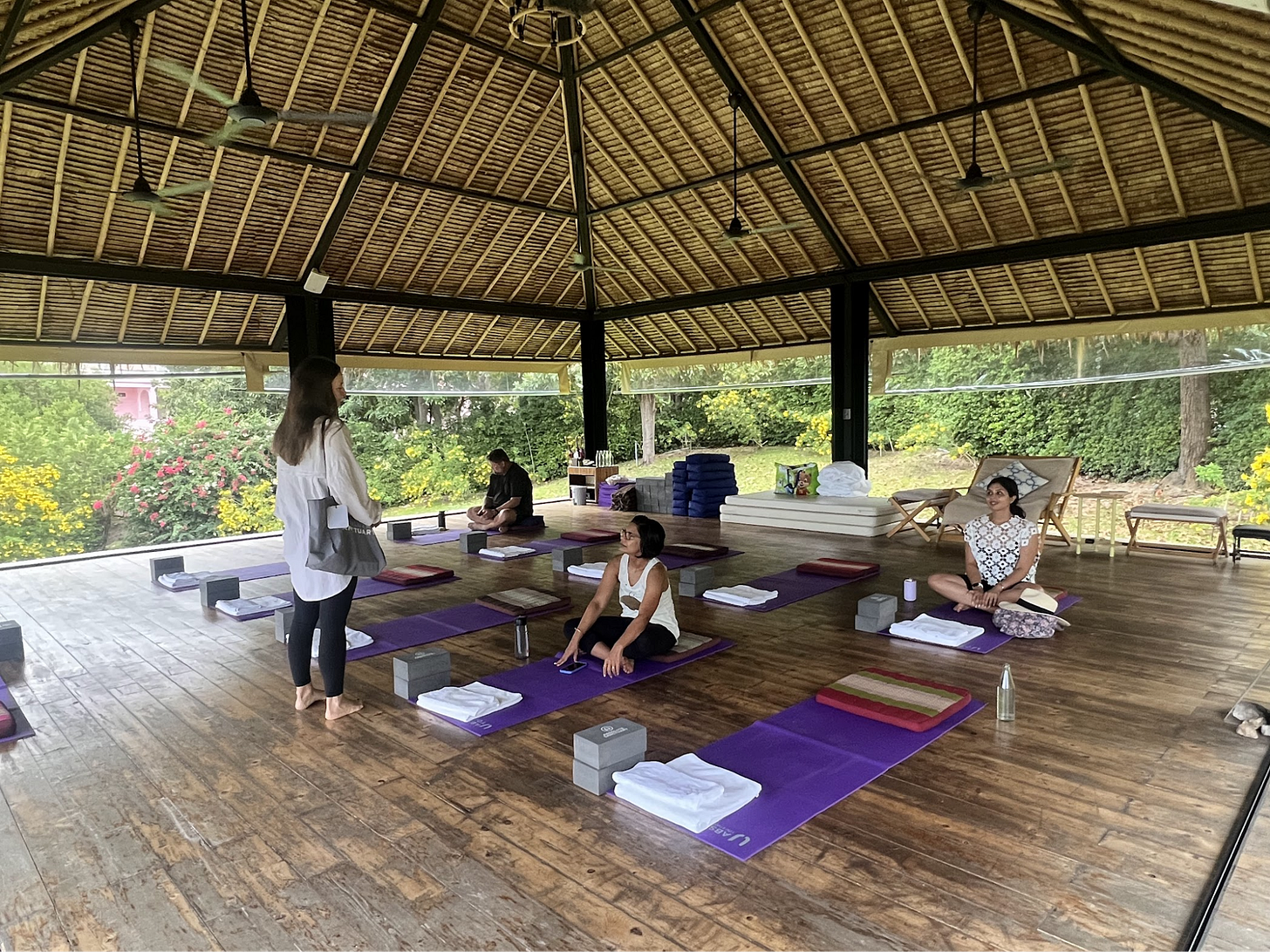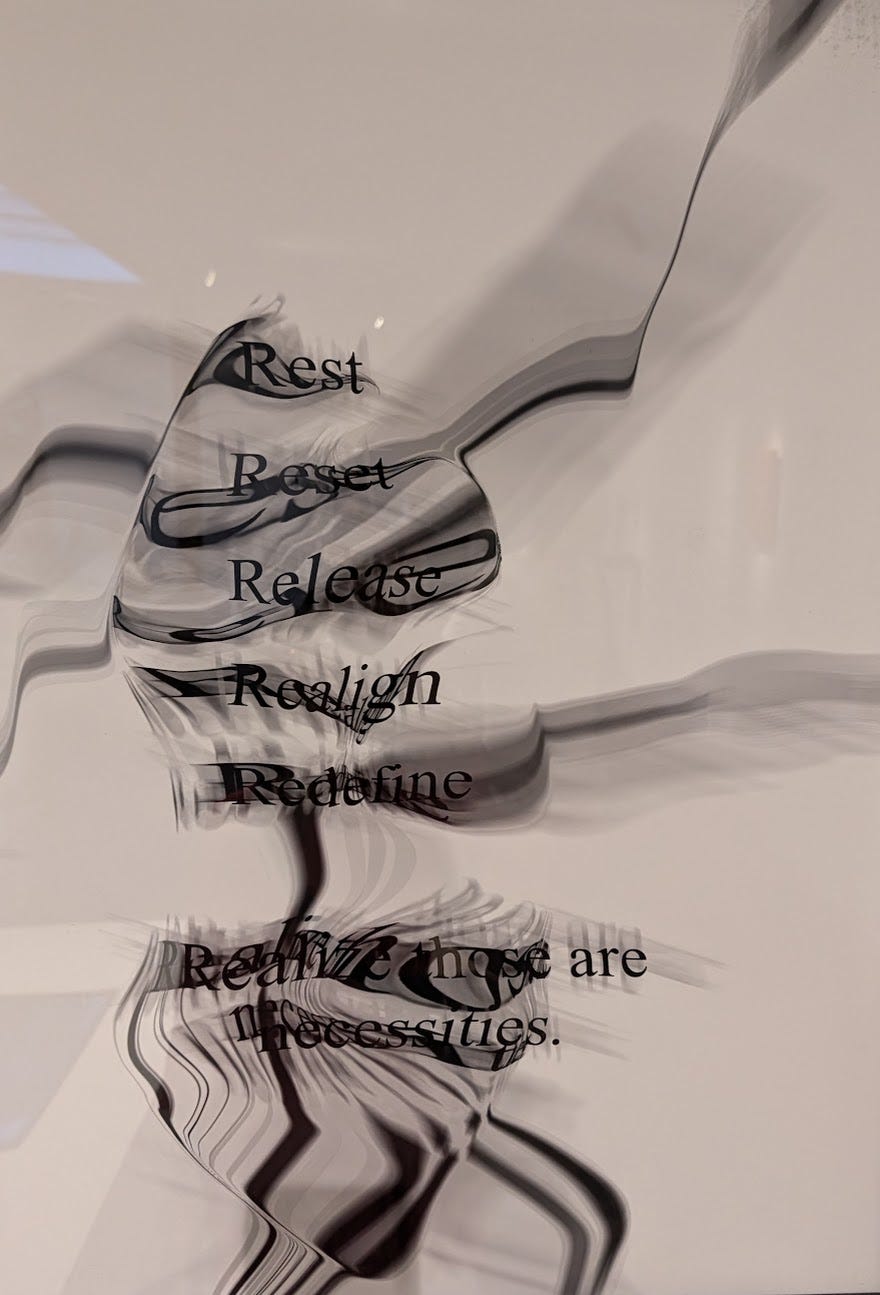Fight, Flight, Freeze or Fawn
Q: How does your body respond to stress?
Kinnari’s Dialogue
Diwali was last Monday but the celebrations lasted all week. This week the various Halloween activities - buying costumes, carving pumpkins, attending my first grader’s school parade and preparing for trick or treating - have taken over my calendar. Outside, the leaves are turning yellow, orange and red and will start to let go soon. Yes, Fall is here - my annual, visual reminder to slow down. However, I’m finding it hard to do so. All the burners are on high — work, home, family, social life — and I’m not sure which one to turn down first.
It is the season of Vata, according to Ayurveda, an ancient Indian healing system. Vata is the dosha (life force that governs the body’s physical and mental processes) of air and ether. As the leaves outside become dry and brittle, this can also translate to our bodies. It is why we must spend a bit more time taking care of our bodies during this season.
That is exactly what Mitali and I did a few weeks ago when we celebrated a dear friend’s 40th birthday in Thailand. Our friend who was close to burnout suggested a week-long wellness retreat. At first when she proposed it, I laughed out loud saying “Are you crazy? I have a full-time job and two kids - there’s no way I can go to Thailand!” But I knew I needed a break and I wanted to be part of her milestone birthday. So I took the plunge and bought the tickets, all the while feeling self-indulgent. However, a day into the trip - between conversations about our health, body treatments, yoga and nutritious freshly prepared meals - I realized that spending the time and money on taking care of myself isn’t indulgent. It’s a necessary salve for these times we live in where we overextend ourselves across our work, family and social lives.
At the retreat I took a Tanita body composition test and discovered to my surprise that my nervous system was close to a pre-burnout state. “How is that possible? This is the healthiest I’ve felt in a long time. I’ve been meditating and moving almost every day this year!“ I said to the resident therapist. “How we feel in our minds is not always indicative of what our body feels.“ She then went on to educate me on the “4Fs” - the way our body responds to either stress or trauma. When the brain perceives a threat, our body can either Fight, Flight, Freeze or Fawn.
“Back in prehistoric times, our ancestors faced real physical dangers—like saber-toothed tigers—and their survival depended on reacting instantly. Today, our “tigers” are more likely to be psychological stressors, like job interviews or deadlines, but the body reacts in the same way. The response is part of your sympathetic nervous system, and it happens without conscious thought; it’s been hardwired into us through evolution to help us survive. When triggered, the body releases stress hormones like cortisol and adrenaline, which boost energy and focus, helping us confront danger, escape, or protect ourselves effectively.”
This insight helped me become a bit more aware of my body’s stress responses. Last week after a morning of volunteering in my first grader’s class and a very hectic day at work, I was feeling pumped about being super-productive. But when I did a check-in at the end of the work day, I sensed the adrenalin coursing through my body. I was talking fast, being snappy and not feeling grounded. Later that evening I got into an argument with my husband, snapping at him for no good reason (stress response: Fight). When invited to multiple Diwali events last week, some on the same day - I struggled to make hard choices and just over-committed and said yes to everything (stress response: Fawn).
“To attain knowledge, add things every day. To attain wisdom, subtract things every day.”
- Lao Tzu
So now as the trees prepare to shed their leaves and conserve energy for the winter, I’m trying to figure out how to conserve my own. Will I be able to finally turn down one burner?
Mitali’s Dialogue
Fall is the time of year when everything seems to speed up. I know I am not the only one who feels this way. Over the past few weeks, I have had numerous conversations with friends, lamenting about their busy schedules and lack of downtime. I try desperately each year to not over-schedule myself but wrestle with saying no to the many Diwali celebrations, Halloween parties and other social events that pop up in October. I know that before I can even catch my breath in November, the planning for Thanksgiving will begin leading into preparations for the winter holidays.
Fall is also the season when I am prone to SAD (seasonal affective disorder). The change in light and temperature means I have to make adjustments to my schedule and habits to take care of my body. When the leaves start to change color in preparation for winter, I am reminded that a depression episode may be around the corner. A couple of weeks ago, in preparation for this season, I decided to read my post from last year. I wanted to remind myself of the habits I had outlined to keep the “December drearies” away -
Stick to a schedule
Create a cozy space in your home
Move your body
Find small things that bring you joy
Engage in energy-gaining social activities
Back then, these tips seemed very practical but as the winter season progressed and I entered 2025, keeping up with these habits on top of family commitments during the holidays became too much. When I get overwhelmed, my body will often cycle through the Fight and Freeze stress responses (as referenced in Kinnari’s post above). I may know rationally the various habits I need to follow to take care of my body, mind and soul. I may attempt to prioritize time for all of them. But when my system is overloaded, I start getting snappy and then start to shut down to conserve energy which often leads to a depression episode.
One of my realizations from earlier this year was the need to do less when in the midst of an episode. Instead of being an over-achiever and trying to do all my habits, I forced myself to slow down and ease off of my self-expectations. Strip things down to the bare minimum and focus on just ONE thing, Mitali. I reminded myself of one of my words for the year “consistency” and I tried to be regular with one habit - moving my body every day. The physical movement helps counteract the Freeze stress response. Somatic, body-focused approaches like walking, yoga, dancing, cold water plunges, saunas, etc bring the energy back up in my body as well as discharge any pent-up tension or swirl in my head.
Doing one thing reliably also allowed me to feel good about myself instead of beating myself up for not doing enough. Keeping a commitment to myself meant prioritizing myself. I scheduled time on my calendar for a quick morning walk instead of trying to squeeze it in between meetings and kids activities. When my schedule got busy, I noticed my mind starting to spin - judging myself or berating myself for not making good choices with my time. In those moments I would remind myself - “Just do this one thing for yourself and forget all your other habits and commitments.”
Over the past five months that is what I have attempted to do. Reduce expectations, drop commitments and focus on accomplishing one thing. No excuses Mitali! I made the effort to take walks during our jam-packed family trip to Norway in July and amidst the chaos of the monsoons and traffic in Mumbai in August. I stopped telling myself that it is unsafe to walk alone in the dark and instead forced myself to try a quick walk after dinner during September. Each day that I kept my commitment to myself made me feel good.
For now doing one thing seems to be working for me. I find myself in a much more stable place this season than I have been in other years. And for the present moment that is good enough.





